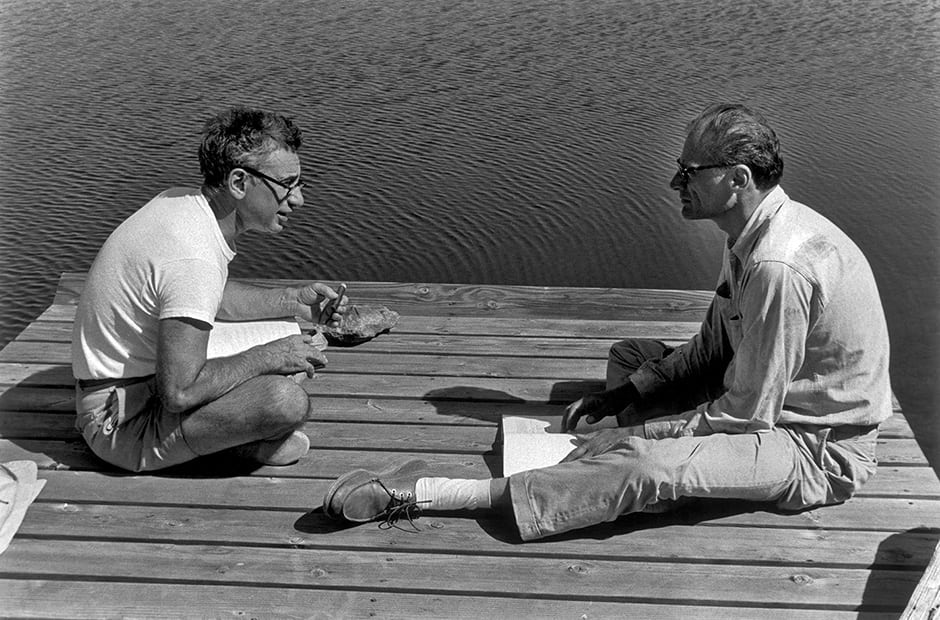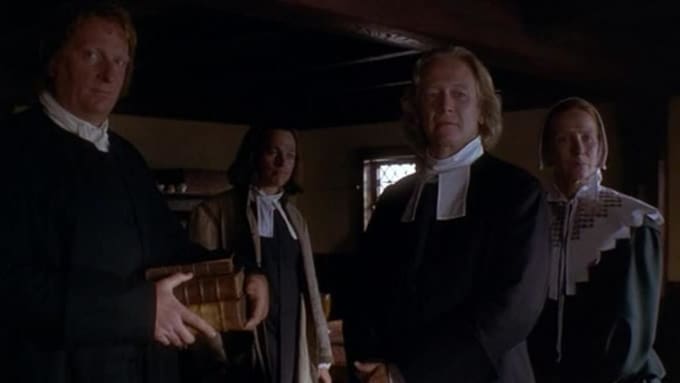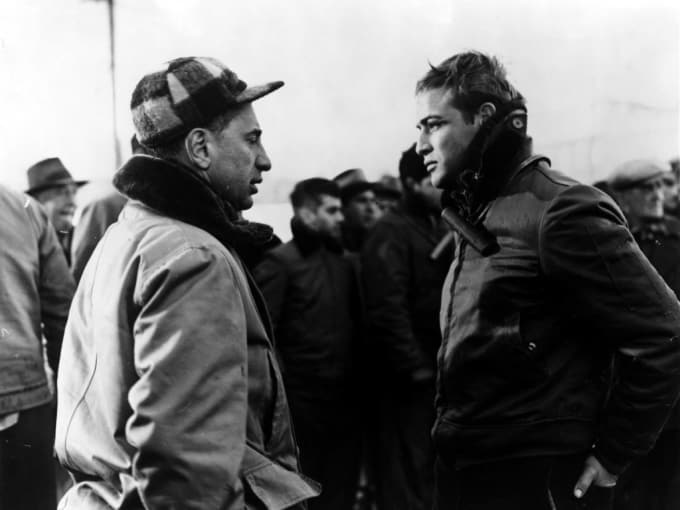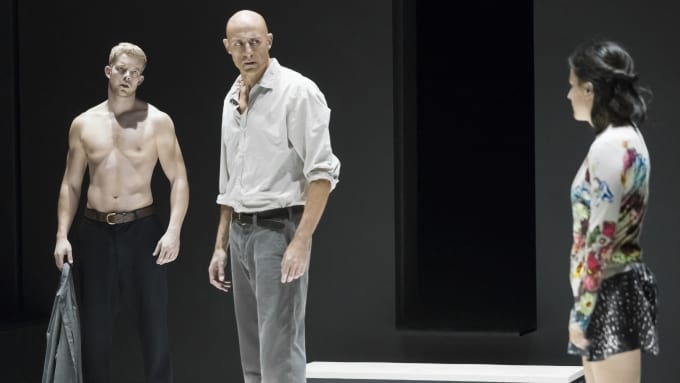Arthur Miller and Elia Kazan
Just another bromance ruined by Communism.

Photo by Jerzy Kosinski, 1971
For a long time, Elia Kazan and Arthur Miller were very good friends. They worked together on plays and films, as the former directed the latter’s play Death of a Salesman on Broadway, which eventually became one of the best American plays of all time. However, the Red Scare and threat of communism had a bad reputation for destroying relationships, personal and business ones.
They were asked to testify under HUAC and name names of those involved with communism in order to be let free and unscathed from this scandal. Miller refused to come into court, while Kazan attended two hearings. The second was when he denounced the names of seven writers, including Miller, costing him friends. Miller refused to name names and accuse others of things they may not be guilty of in order to clear his own name.

via 20th Century Fox
Arthur Miller Reacts with "The Crucible"
The Crucible revolves around the Salem Witch Trials of 1692. A group of teenage girls, lead by the charismatic Abigail Williams, persuade their town that social outcasts do not fit in because they are witches. Laced with an adulterous affair between Williams and the respectable John Proctor, hysteria ensues as the Puritan town attempts to rid of alleged witches.
Intolerance and hysteria due to those gullible enough to believe in witchcraft make the story moving and incredibly captivating, political context considered or not. Miller’s influence stemmed from time he spent in Massachusetts researching the Salem witch trials of 1692. It is incredible how easily the girls of Salem were able to manipulate members of the court into believing that the social outcasts of the town were just that because of witchcraft.
Miller recalled in his memoir how the HUAC hearings were “profoundly ritualistic,” which is similar to how Salem had public hearings for everyone to witness confessions of witchcraft, regardless of how true they were. Thus, these events served as influence for his play, The Crucible.
One of the most powerful quotes in The Crucible is in the final act, when John Proctor decides to give up his life in pursuit of staying true to his virtues. He says, “Because it is my name! Because I cannot have another in my life! Because I lie and sign myself to lies!...I have given you my soul; leave me my name!” He is obsessed with a good reputation and being honest. This attitude reflects how Miller felt when being interrogated. In Miller’s decision not to name names, John Proctor believed in keeping one’s self in an honorable position, along. With not betraying his friends in order to save himself. Throughout the play, whenever Abigail and her friends were asked to name names, they were constantly told that “you can save yourself if you tell me who it was”.
Overall, there was a total of 19 executions in Salem from the Witch Trials. Everyone lived in a constant state of fear, similar to those frightened by Communists. Their town was full of paranoia. The trials were scrutinizing, and the hangings were made a public spectacle.
Retrospectively, many people think that Miller did not mean to poke fun at HUAC and write a play in a direct attack against Kazan. The incredible and moving story of those in Salem, 1692 was merely similar to what was going on in the government. Regardless, The Crucible is the most widely recognized and talked about analogy when it comes to culture pieces and the Red Scare.
Kazan was highly criticized for his actions, and as a result, he made On the Waterfront to further defend his stance after The Crucible was out as a play.

Via Columbia Pictures
Elia Kazan claps back with "On The Waterfront" and a few Oscars
Interestingly enough, On The Waterfront is based on Miller’s screenplay of the same name. When the play was in initial talks for an adaptation, Hollywood wanted to place communists in the film for a more explicit attack on them, but Miller refused. Kazan took over the project instead, which is more autobiographical for him. Kazan integrated issue-driven subjects into his films. He was concerned with social issues. On The Waterfront is such an obvious blacklist allegory, as the protagonist decides whether or not he will testify to the Crimes Commission.
On The Waterfront stars Marlon Brando as Terry Malloy, a dockworker who has trouble standing up to his dock bosses in Hoboken, New Jersey. After witnessing the murder of Joey Doyle and meeting the victim’s sister Edie (Eva Marie Saint), Malloy struggles in telling people what he saw and who committed the crime in fear of being punished for being honest. His bad reputation as a bum makes him seem like such a bad person just for keeping to himself, which was the vibe Kazan wanted to give off, since Miller refused to name names.
When the FBI approaches Malloy to confess any information he has, Malloy is told “you have every right not to talk if that’s what you choose to do...the public has the right to know the facts.” Similar to the pressure put on Kazan and Miller, authorities are trying to get Malloy to give information. Father Barry (portrayed by Karl Marden) also calls for confessing in order to emphasize Kazan’s point about informing being the morally correct choice. He says, “how can we call ourselves Christians and protect us from the murderers with our silence?” Along with the fact that everyone who doesn’t do anything when bad things are happening share the guilt. Father Barry’s belief in the transformative power of faith helps guide Malloy in the right direction.
The film was influenced by a series of articles in the New York Sun by Michael Johnson which followed longshoremen and their killing of a dock hiring boss from New York. The leading characters were based on real people that worked on the docks, which also gave the content that Kazan presented some veracity and authenticity beyond being an anti-communist propaganda film.
Even though the film was a commercial hit and won Academy Awards, there was lots of political criticism surrounding Kazan’s work. The justification of Kazan’s naming names caught up to him.
By remaining silent, you essentially give into the fear, which is communism’s goal. By saving himself, Kazan thought he was doing something that would ultimately benefit everyone else (which, it did not). Malloy represented those that HUAC sought out for questioning, and he receives pressure to speak up from many people throughout the movie.
On the Waterfront is heavily connected to the naming names notion. Intended as a direct attack to Miller for not giving up his friend’s names in order to save himself from the destructive path communism created. For example, the defense of informants is, “if I spill, my life ain’t worth a nickel”with the repercussion of “But what is your soul worth if you don’t?” In the world of the mobs and the longshoremen, power definitely corrupts and this all ties back to the Red Scare and HUAC and McCarthyism.

via JAN VERSWEYVELD, "Variety"
Miller has the last word with "A View from the Bridge"
A View from the Bridge was Arthur Miller’s reaction to Elia Kazan’s On The Waterfront. The play is about naming names, being a part of a community, and self-interest, which is Eddie (the protagonist’s) tragic flaw. A View from the Bridge is the story of Eddie and his wife Catherine, as they house Catherine’s immigrant family members in 1950s Brooklyn. Eddie develops feelings for Beatrice, Catherine’s niece, and becomes paranoid that his wife will leave him and marry Rodolpho, one of the immigrants in order to gain citizenship. Eddie is constantly annoyed, and makes passionate yet irrational decisions, ultimately causing his death.
Eddie rats out Marco and Rodolpho to immigration in order to ship them back to Italy in order to get rid of the romantic competition. However, before the two Italians go, Marco kills Eddie.
Throughout View, there is a steady theme of naming names, along with the consequences and repercussions of doing so. Eddie feels this pressure, as his tragic flaw is self-interest. He wants to make advances on Beatrice, yet keep his wife with him, and his behavior is viewed as very paranoid.
Ultimately, Eddie’s self-interest is immoral, as he does what he does for his own romantic gain. His feelings for Beatrice are irrational, along with what he decides to do about them. At the end of the play, Catherine states, “What’re you scared of? He’s a rat! He belongs in the sewer…He comes when nobody’s lookin’ and he poisons decent people!” Clearly, there is a negative connotation Miller explicitly places on naming names and ratting out those close to you (ergo, Kazan was wrong in claiming Miller was a communist). Eddie pulls everyone else in the play into his own personal conflict.
Eddie says “Just remember, kid, you can quicker get back a million dollars that was stole than a word that you gave away” in Act I. This is very similar to the quote mentioned prior from On The Waterfront about selling your soul for cheap.
The raw power struggle is vividly depicted in all three scripts, between the necessity of naming names, clearing your soul by doing so, and ratting out your friends, whether or not the accusations were entirely correct.
